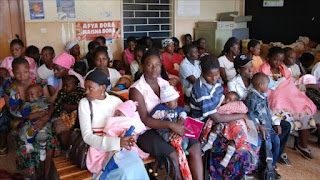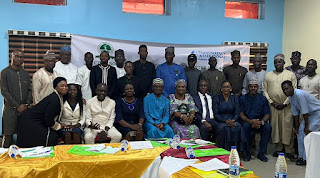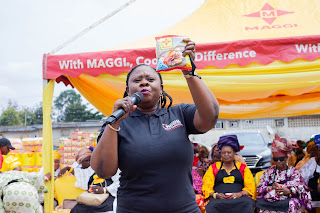Trump’s GGR: Nigeria Becoming Unsafe To Live, Procreate
By Chioma Umeha
“It was a Monday. I started working early; I cleaned my
salon and washed all the towels. When I finished I went to Randle Health Centre
and picked up two pregnancy tests.
“I honestly didn’t think I was pregnant, but wanted to put
my mind at ease. I remember seeing the two lines show up and I burst into
tears. This couldn’t be happening. Quickly, I visited my childhood friend,
Adegoke at Apapa Road, Ebute Metta.
She accompanied me to another Lab, close to Oyibo Market. There, I took
another one. Positive! I was pregnant.”
This is the story of Mojisola, (not real name) a 37-year-old
lady, hair dresser and secondary school leaver.
Moji as she is fondly called by acquaintances spoke
exclusively to DAILY INDEPENDENT during an investigative tour of Otumara
Community, Apapa area of Lagos.
Palpable pains and regrets were still noticeable from her
expression as she continued her narrative concerning who was responsible for the
pregnancy.
She said, “I was raped by some miscreants on my way to my
house after work one Saturday. Hardly, did I expect that pregnancy as I was not
ovulating at that time. So I did not want the pregnancy.
“I was 30 at that time. I continued to sob bitterly. Adegoke
was trying to make me calm. She promised to help me terminate the pregnancy.
She took me to a Chemist somewhere on Apapa Road.
“All I still remember is that the chemist took a needle
filled with improvised explosives and inserted it into my uterus. She further gave me an herbal potion to
drink to flush my uterus. Since I got married, I have been struggling to have a
child.”
But, this deeply hidden secret later became a public
spectacle she bled profusely and was at death’s door. When she next woke up
after the ugly exercise, Moji told DAILY INDEPENDENT that she found herself at
the Lagos University Teaching Hospital
(LUTH), Idiaraba on a drip, breathing from an oxygen mask and running
low on blood.
Doctors told her she was lucky to be alive. But, her uterus
was removed after it became ruptured. Today, she is struggling with
infertility.
These are just some of the things that girls and women turn
to – 25 million times a year – in a desperate attempt to end their unintended
pregnancies. Some live to tell their stories. Many others do not.
Counterfeit drugs, quack doctors, tea-leaves, knitting
needles, even small bottles filled with improvised explosives are inserted into
the uterus. Unsafe abortion is a major contributor to maternal mortality.
Today, unsafe abortions account for up to 11 per cent of
global maternal deaths. A report
by Marie Stopes International states, “The problem is particularly acute in the
developing world. Across the different regions where we work an estimated five
women die every hour as a result of unsafe abortion, and around the world
around eight million more women suffer serious complications.”
And these numbers are likely to rise following the
re-introduction of the Mexico City Policy – a Republican policy that blocks US
Government funding to non-US organisations that perform abortion with their own
funding, according to health industry analysts.
Many health industry watchers are seriously worried that
this policy is at the moment negatively impacting on women’s health and their
opportunities for the future,
They have condemned the policy which blocks funding to the
world’s largest providers of modern contraception, stressing that it is
counter-productive.
Analysts are worried that the policy has reduced women’s
ability to prevent unplanned pregnancies while the number of women undergoing
unsafe abortion has increased.
This is because of the stigma and misinformation that still
surround the procedure. Even in countries where abortion has been legal for
decades, abortion often remains a controversial subject with those against the
procedure giving political, moral, social, ethical and religious reasons.
In Nigeria, abortion is legal only when performed to save a
woman’s life. Still, abortions are common, and most are unsafe because they are
done clandestinely by both skilled and unskilled providers.
The long-term impact of the ‘global gag rule’ has become
very visible as family planning providers project that approximately two
million women would be denied sexual and reproductive health services as a
result of the order reinstated sometime last year.
Family planning and global health experts warn that the full
consequences would continue to unfold.
Marie Stopes International (MSI) which provides
contraception and abortion services in 33 developing countries has calculated
it faces an $80 million funding gap as a result of the decision, which slashed
17 per cent of its donor income.
MSI has already closed some services in these countries.
Under the expanded version of the “global gag rule”
introduced by President Donald Trump soon after his inauguration in January
2017, foreign NGOs that receive any United States global health assistance are
prohibited from performing or promoting ‘abortion as a method of family
planning.’ That includes offering legal advice or counseling related to
abortion.
Some foreign organisations such as MSI have chosen to forgo
U.S. funding and continue their work in women’s health – but the loss of resources could result
in an additional 2.5 million unintended pregnancies, 870,000 unsafe abortions,
and 6,900 avoidable maternal deaths, the organisation claims, leading to a 107
million pounds ($150 million) increase in direct health care costs.
“Unless we can fill the $80 million gap created by the
global gag rule, it would deprive millions of women of the contraception they
need to prevent an unintended pregnancy, and it is the world’s poorest women
and girls who will bear the brunt,” Marjorie Newman-Williams, Marie Stopes
International’s vice-president, said recently in a press release.
Commenting on the impact of the GGR on women and girls,
Dimos Sakellaridis, the Country Director, DKT International Nigeria, said it is
an infringement on their reproductive health and rights as well as a setback on
family planning campaign.
“The law has reversed the global progress made on
contraceptives, family planning and reproductive health rights. It takes away
the option a woman has to decide when and if she wants to have children.
The family planning expert predicted that because of
Trumps’s GGR policy, “The rate of maternal mortality would shoot up and
majority would result from unsafe abortion.”
Sakellaridis in an exclusive interview with DAILY
INDEPENDENT noted, “The negative impact can better be imagined. We must not
forget that for every woman who is denied access is a tragedy waiting to happen
because of unplanned pregnancies, unsafe abortions and potential death. There
will be an additional 660,000 abortions in Nigeria over the next four years,
with 10,000 women dying as a result.”
Implementers also say it is impossible to estimate the true
impact since many aspects are unquantifiable.
“The impact is not just about the size of project or
country. Each individual service works through delivering health care, gaining trust with local communities,
advocating health improvements and educating and empowering people to take
control of their lives,” according to Rosemary Gillespie, interim director
general of the International Planned Parenthood Federation, the world’s largest
sexual and reproductive health NGO, which believes it stands to lose $100
million in funding as a result of the gag rule.
The fact that the Trump administration’s version of the
policy applies to non-U.S. NGOs receiving any U.S. health assistance – rather than just family planning as
with previous iterations of the policy – has also made it more difficult to
predict the impact, experts say.
Recent data from the Guttmacher Institute suggest there
remain 214 million women and girls worldwide who want to avoid or delay
pregnancy but do not have access to contraception.
The most vulnerable at risk
Reacting, Professor Innocent Ujah, a Professor of Obstetrics
Gynaecology, notes, “Unfortunately, the cut of fund for life-saving services by
the US government under the GGR of Trump’s Administration will further worsen
the maternal morbidity and mortality indices in all the developing countries of
the world, Nigeria, inclusive. The overall reproductive health services will be
the worse for it.”
Faulting the current abortion laws in the country, Ujah who is also Consultant
Obstetrician and Gynaecological Surgeon,
in an interview with DAILY INDEPENDENT, says they are very restrictive, as
abortion is allowed only to save the life of woman.
The don currently with Department Of Obstetrics and Gynaecology, University of Jos and Jos University Teaching
Hospital, Jos, Plateau State,
laments, “Unfortunately, many young girls and even married are
dying in large numbers in Nigeria
from unsafe abortion that is clandestinely performed by quacks.
Commenting on the way forward, he says, “Nigeria needs to
step up its family planning/contraceptive services to prevent unplanned and
unwanted pregnancy, particularly for the adolescents while it looks at the laws
again in such a way as to be modified to accommodate issues of incest and
rape.”
He tasked the government on its commitment, saying, “I want
to suggest that Nigerian Governments should respond appropriately by increasing
the budget for Reproductive Health and also make family planning widely available
to mitigate the effects of the GGR Rule.”
On her part, Dr. Abiola Akiyode-Afolabi, Women Advocates
Research and Documentation Center, (WARDC) Lagos, laments, the GGR rule has penalised hundreds of
Non-governmental organisations (NGOs) and the women they serve in nearly 60
countries across the world.
Akiyode-Afolabi who spoke during a recent training of the
Network of Reproductive Health Journalists of Nigeria (NRHJN) in Ibadan, Oyo
state, decried the rate of illegal abortion, saying “GGR has destroyed the
world and killed women who are at the receiving end.
“The rule thus jeopardise women’s right.”
She gave the context of unsafe abortion in Nigeria in her
presentation titled, ‘Global gag rule (GGR) overview and the implication for
NRHJN.’
“Of the 40 to 60 million abortions that take place annually,
at least 20 million are performed under unsafe, illegal conditions and up to 50
per cent of these women require follow-up gynecological care.
Bemoaning the impact of unsafe abortion in Nigeria, she
says, “Millions suffer permanent physical injuries, and at least 78,000 women
die. Most of these deaths are preventable, and occur in countries where access
to abortion is highly restricted or illegal altogether.
As research shows, nearly half of all unplanned pregnancies
end in abortion in Nigeria. One in seven Nigerian women aged 15 to 49 has tried
to obtain an unsafe abortion, either from ‘unqualified practitioners or
qualified ones working under substandard medical conditions.’
“The restrictive abortion law means most abortions are
clandestine and “very frequently unsafe,” Akiyode-Afolabi adds.
Painting a gory picture of the consequences, she states, “As
a result, one quarter of all Nigerian women who have had an abortion report
moderate or severe complications, and two thirds of women who have an unsafe
abortion experience serious health consequences.
“Every year, hospitals in Nigeria treat approximately
142,000 women and girls for complications resulting from unsafe abortion. Based
on recent reports, between 10, 000 to 34,000 women in Nigeria die annually as a
result of unsafe abortion.
“Even where a woman obtains a legal abortion at a health
care facility, inadequate staffing, training and equipment expose women to
unnecessary risks. Among those who have an abortion performed by a physician, a
large number developed complications and sought post-abortion care, indicating
that the performing physician was not well-trained in abortion services. Few
general practitioners receive training to perform abortions.”




Comments
Post a Comment